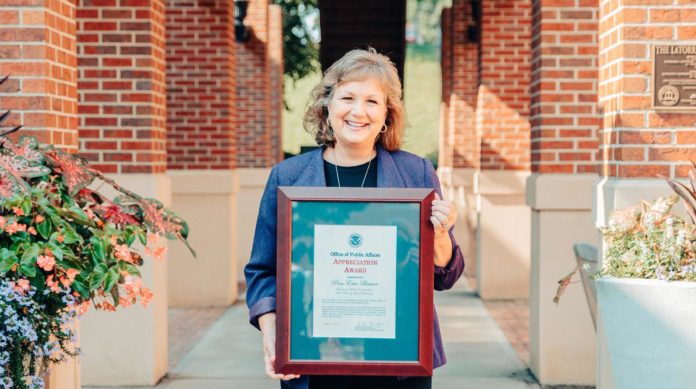
Some Mercer students can add working with the Department of Homeland Security (DHS) to their resumes.
For the past five years, students in Dr. Pam Brewer’s usability classes have assessed DHS websites. Dr. Brewer, technical communication professor in the School of Engineering, teaches the course every spring and has had four undergraduate classes and one graduate online class involved in these projects.
Mercer students have analyzed DHS websites related to careers, science and technology, cybersecurity, FEMA, the Countering Violent Extremism Task Force, “If You See Something, Say Something” campaign, REAL ID Act, Ready.gov disaster planning initiative, Federal Law Enforcement Training Centers and U.S. Coast Guard, said Matthew Harmon, DHS director of web communications.
They have virtual meetings with representatives of the sites, design test plans, recruit three to five participants in their target audience, interview and observe their study participants as they navigate the websites, analyze the data, and report their findings back to the DHS contacts.
“What they’re seeking to do for the Department of Homeland Security is to reveal any problems with the website but also to recognize things that are working well and then to give them that feedback,” Dr. Brewer said. “They’ve made a lot of changes based on our recommendations.”
The student teams look at things such as findability, navigation, terminology, satisfaction, appearance, overall quality, and how easy to learn and memorable a site is. The DHS stakeholders are able to get an in-depth study of their sites, with statistical confirmation of the findings, Dr. Brewer said. Many have asked Mercer to assess their sites again so they can further refine them.

“We keep coming back because the Mercer students have consistently provided top-notch information that we can actually use to improve our websites,” Harmon said. “Each time we’ve run a study with Mercer students, it’s been on sections of websites that we were actively working on or something that we had recently launched. So, their feedback has been absolutely critical in either helping us prioritize development before action is taken or measure effectiveness of work that has already been done.”
For example, the information that Mercer provided on DHS’ science and technology pages helped DHS provide the justification to start planning a restructure of content, said Amanda Glenn, chief of web and digital engagements for the department’s Science and Technology Directorate.
“We completed a major revitalization of our website in 2017, in no small part due to the input we received in 2016 and 2017,” she said. “The team in 2017 reached out to actual first responders across multiple disciplines and had them search for information directly related to their needs. It was extremely helpful to have that operational-type feedback about the site and how we could make it more useful.”
In April, Dr. Brewer and Mercer’s Department of Technical Communication received an appreciation award from DHS, recognizing their contributions toward improving the usability of DHS websites.
Hannah Vann, associate director of Mercer’s Quality Enhancement Plan, and Kelly Smith, senior technical writer for Dart Container Corp., both took the graduate-level version of the class this past spring. Smith, who earned her Master of Science in Technical Communication Management in July, said her career path has moved from programming to technical communication, and she took the class because she wanted to learn something new.
“I’m really attracted to the practice of usability studies, figuring out how to make things work for different types of people,” said Vann, who is enrolled in the Technical Communication Management master’s program. “The people who do usability think a lot about marginalized groups, so they look a lot at accessibility. I think it’s really interesting to think about specific user groups, how their needs can make using a product better for everybody.”
Smith worked on the Federal Law Enforcement Training Centers website, which DHS wanted to be more usable and look more like a university webpage, she said. Hannah worked on the Coast Guard website for the deputy commandant for mission support, and the target audience was Coast Guard spouses.
“Any time students know that they’re doing something real, they become more interested,” Dr. Brewer said. “They really respond when they know that something they are going to do will be used. They’re impressed with the fact that they’re working with an organization as high profile as DHS.”
Vann said the class pushed her outside her comfort zone and changed her mindset. Now, she’s always thinking about how her office can do small usability evaluations in order to be make information as accessible as possible.









